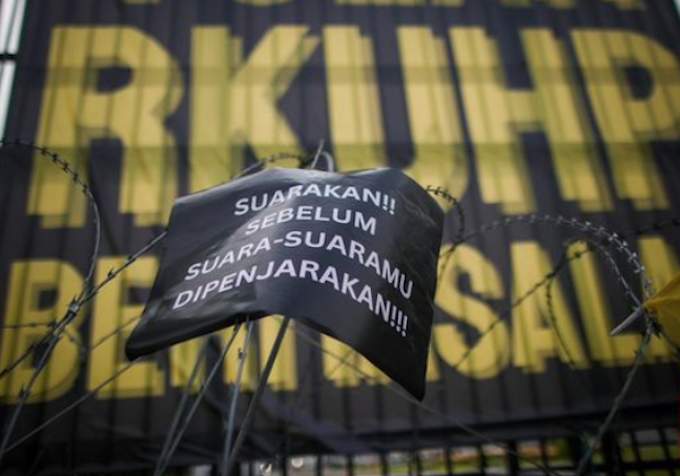
Civil society organisations which make up the National Alliance for Criminal Code Reform have slammed the decision by the Indonesian government and the House of Representatives (DPR) to ratify the Draft Criminal Code (RKUHP) which is seen as still containing a number of controversial articles, reports CNN Indonesia.
Indonesian Legal Aid Foundation (YLBHI) chairperson Muhammad Isnur criticised the DPR and the government because the enactment of the law was rushed and did not involve public participation.
According to Isnur, a number of articles in the RKUHP will take Indonesian society into a period of being “colonised” by its own government.
- READ MORE: Protests erupt across Indonesia after House ratifies ‘colonial’ Criminal Code
- Other reports on the Indonesian Criminal Code
“Indeed the latest version of this draft regulation was only published on November 30, 2022, and still contained a series of problematic articles which have been opposed by the public because it will carry Indonesian society into an era of being colonised by its own government,” said Isnur in a statement.
The Civil Coalition, as conveyed by Isnur, has highlighted a number of articles in the RKUHP which are anti-democratic, perpetuate corruption, silence press freedom, obstruct academic freedom and regulate the public’s private lives.
According to Isnur, these articles will only be “sharp below but blunt above”, meaning they will come down hard on the poor but go easy on the rich, and it would make it difficult to prosecute crimes committed by corporations against the people.
“Once again this will be a regulation which is sharp below, blunt above, because it will be difficult to prosecute criminal corporations that violate the rights of communities and workers,” he said.
Criminalised over ideas
The Coalition for example highlighted Article 188 which criminalises anyone who spreads communist, Marxist or Leninist ideas, or other ideas which conflict with the state ideology of Pancasila.
According to Isnur, the article is ambiguous because it does not contain an explanation on who has the authority to determine if an idea conflicts with Pancasila.
According to Isnur, Article 188 has the potential to criminalise anyone, particularly government opponents, because it does not contain an explanation about which ideas conflict with Pancasila.
“This is a rubber [catchall] article and could revive the concept of crimes of subversion as occurred in the New Order era [of former president Suharto],” he said.
Then there are Articles 240 and 241 on insulting the government and state institutions.
He believes that these articles also have the potential to be “rubber” articles because they do not provide a definition of an insult. He is also concerned that the articles will be used to silence criticism against the government or state institutions.
The Coalition believes that there are still at least 14 problematic articles in the RKUHP. Aside from the spreading of communist ideas and insulting state institutions, there are several other articles such as those on morality, cohabitation and criminalising parades and protest actions.
Law ‘confusing’
The DPR earlier passed the RKUHP into law during a plenary meeting. A number of parties believe that the new law is confusing and contains problematic articles. These include the articles on insulting the president, makar (treason, subversion, rebellion), insulting state institutions, adultery and cohabitation and “fake news”.
Justice and Human Rights Minister Yasonna H. Laoly has invited members of the public to challenge the law in the Constitutional Court if they feel that there are articles that conflict with the constitution.
“So we must go through constitutional mechanisms, right. So we’re more civilised, be better at obeying the constitution, the law. So if it’s ratified into law the most correct mechanism is a judicial review,” said Laoly earlier.
Deputy Justice and Prosperity Minister Edward Omar Sharif Hiariej, meanwhile, is asking those who consider the law to be problematic or rushed to come and debate the issue with the ministry.
“You try answering yourself, yeah, is 59 years rushed? If it is said that many oppose it, how many? What is the substance? Come and debate it with us, we’re ready and we are truly convinced that if its tested it will be rejected,” said Hiariej.
Translated by James Balowski for IndoLeft News. The original title of the article was YLBHI Kecam Pengesahan RKUHP: Masyarakat Dijajah Pemerintah Sendiri. Republished with permission.











































